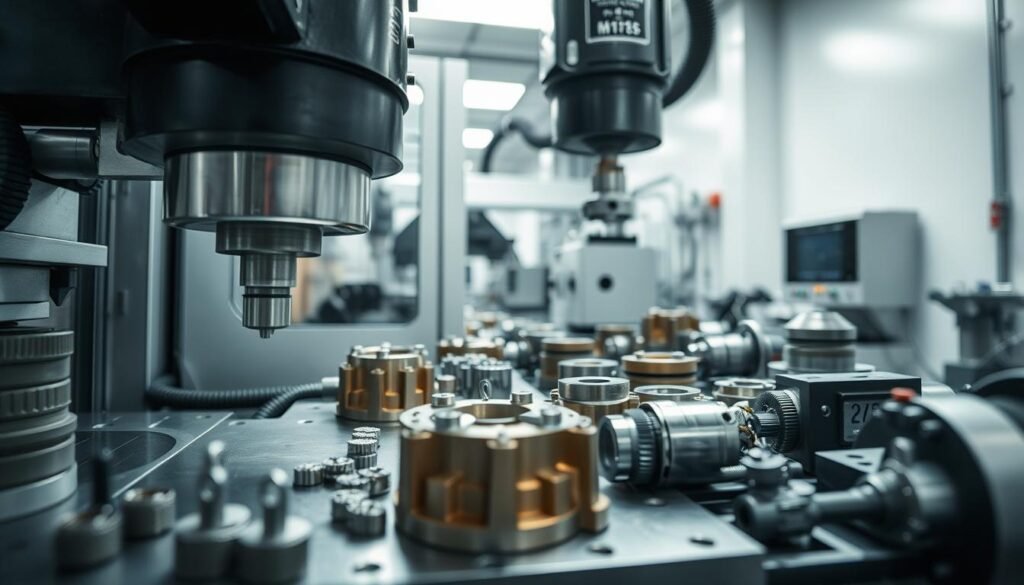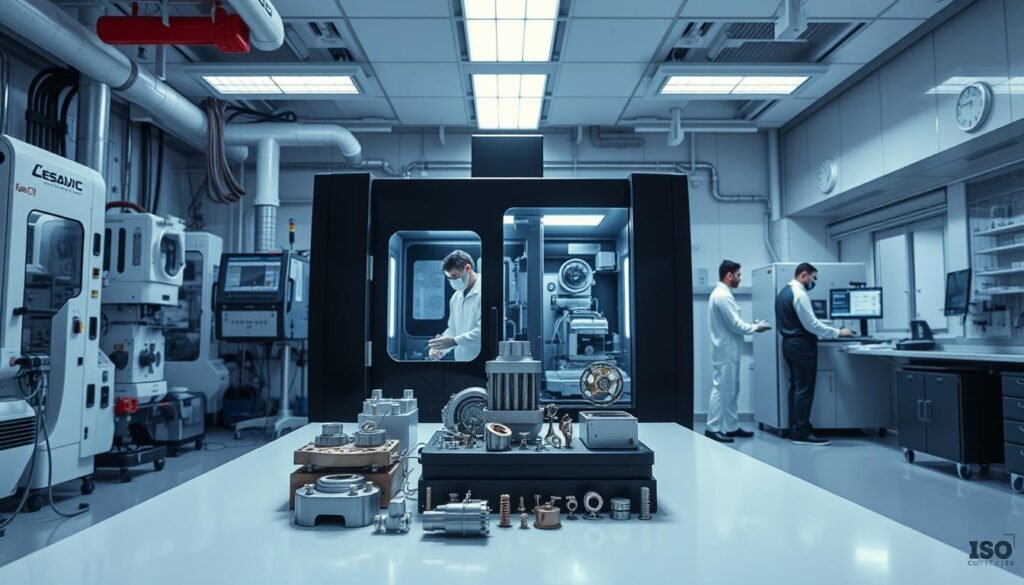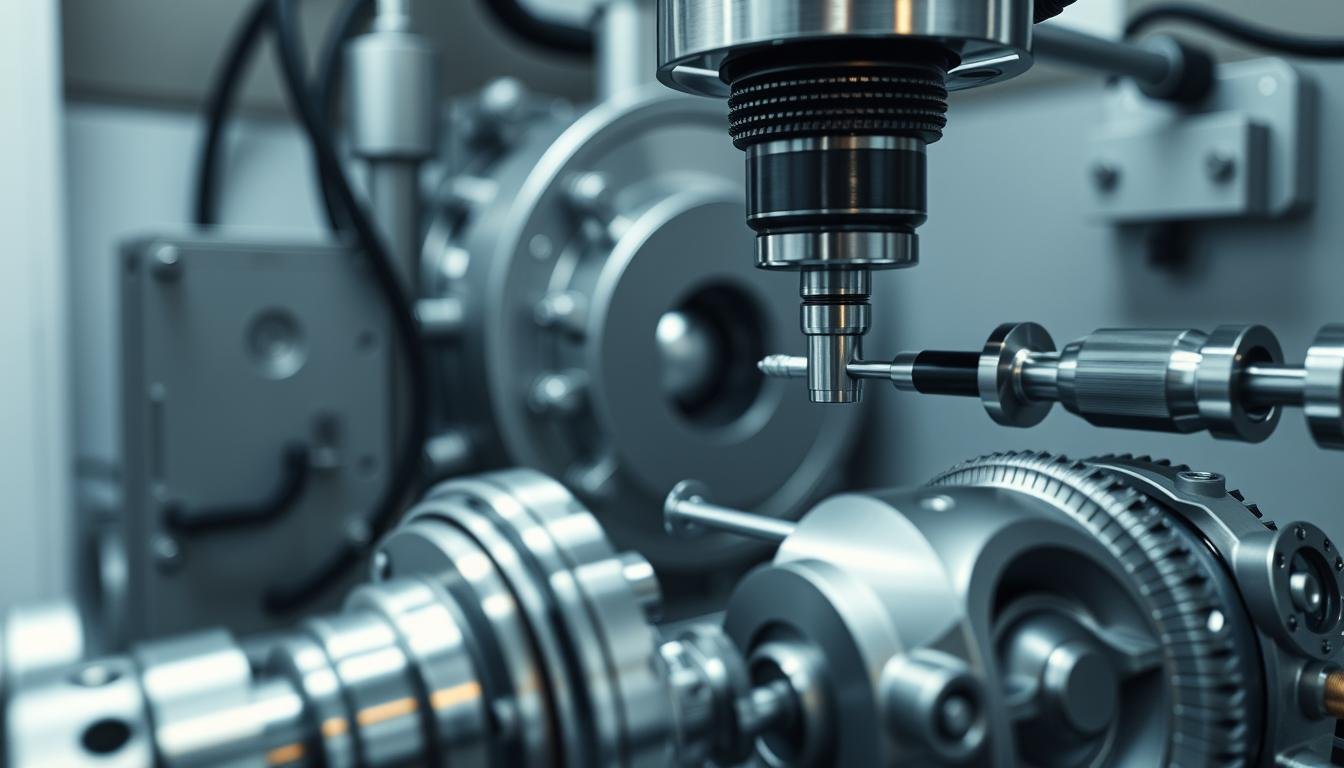In the medical device industry, medical CNC machining is vital. Lives depend on device quality and reliability. McCormick Industries is at the forefront in precision medical components manufacturing in the USA. Located at the core of America’s tech scene, they consistently provide top-notch medical CNC machining.
McCormick Industries holds an ISO 9001:2015 certification. This shows their quality commitment. They use advanced technology and skilled workers to make components. They meet high medical standards. Techniques like Swiss Precision Machining are used. They work with stainless steel, titanium, and medical plastics to make impressive CNC medical device manufacturing products. Precision combines science with a duty to patient safety and healthcare outcomes.
Experts at McCormick Industries collaborate closely. They deliver medical machining services that extend what’s possible. They handle both large production runs and detailed custom projects. Their work highlights American ingenuity. It’s crucial for modern healthcare globally, providing hope and healing.
Key Takeaways
- McCormick Industries provides specialized medical CNC machining services for high precision medical components.
- Advanced CNC technologies ensure components meet stringent tolerances for patient safety.
- Diverse materials such as titanium and medical-grade plastics are expertly handled to deliver quality products.
- Compliance with ISO 9001:2015 standards underlines a commitment to stringent quality control.
- Ear-marked as an industry leader, this facility exemplifies the pinnacle of CNC medical device manufacturing in the USA.
Understanding Medical CNC Machining in the Healthcare Industry
The field of high-quality medical CNC machining is key in modern healthcare. It ensures medical equipment is precise and reliable. Companies like McCormick Industries lead with efficient software-driven computerized manufacturing. They make parts that meet the strict standards needed in medicine.
Medical equipment manufacturing is about making special devices. These must work well, last long, and be safe. With CNC machining, making everything from simple tools to complex implants gets easier.
CNC technology in healthcare means not just efficiency. It also brings to life complex designs impossible before. This stresses the value of high-quality medical CNC machining. Multi-axis systems and automation mean quicker production and lower costs.
The medical field uses many safe materials. Titanium and stainless steel are strong and safe. Advanced plastics and composites like PEEK are durable and resist chemicals. They make sure medical tools and implants are safe in the body. This shows how reliable medical equipment manufacturing is.
CNC machining’s great adaptability aids many medical needs. It can switch easily with design changes. This means medical devices can improve as medical care gets better. CNC technology is vital in healthcare, boosting medical device quality and timely production.
By integrating efficient software-driven computerized manufacturing in medical equipment manufacturing, the demand for top-notch, reliable medical devices is met. This allows the healthcare industry to continue giving excellent patient care.
The Significance of Precise Medical Components in Modern Medicine
Modern medicine depends on precise medical components. These are vital for medical tools and devices’ success. Techniques like custom medical machining and CNC medical prototypes are key to meeting high medical manufacturing standards.
Medical CNC milling creates precision medical components for safe use. They help medical devices work better and reduce infection risks.
Why Precision Matters in Medical Manufacturing
Precision is crucial in medical manufacturing. CNC medical prototypes allow for perfect component fit in devices. Custom medical machining ensures components meet strict specifications for patient safety and procedure success.
The Role of Smooth, Sterile Surfaces in Medical CNC Components
Medical CNC milling produces components with smooth surfaces. These surfaces can be sterilized well, eliminating microbes. This is key for patient health and successful medical procedures.
High-quality precision medical components make medical devices highly effective. CNC medical machining leads to safer, personalized care. This supports better patient outcomes and medical advancements.
Advanced Technologies Employed in Medical CNC Machining
In medical equipment making, Swiss Precision Machining technology, CNC turning, and CNC milling are key. McCormick Industries leads in using these technologies to make better medical devices.
Swiss Precision Machining technology gives McCormick Industries the accuracy needed for medical parts. It reaches tight tolerances up to ±0.0001 inches. This is vital for safe and reliable medical devices. CNC turning and milling make sure products meet medical standards.
| Technology | Description | Benefits |
|---|---|---|
| Swiss Precision Machining | High precision machining technology. | Extraordinary accuracy, ideal for complex parts. |
| CNC Turning | Process of machining parts by ‘turning’ rod material. | Efficient for producing cylindrical components. |
| CNC Milling | Uses rotary cutters to remove material. | Allows versatile shaping and features. |
These CNC tech advancements boost production efficiency. They also improve the making of medical CNC devices. This helps tackle complex medical problems with new solutions. Enhancing the craft of medical CNC is vital.
McCormick Industries’ use of CNC milling and CNC turning changes medical device production. With these, makers can create better medical products. They also make these products faster and more available, speeding up medical breakthroughs.
Medical CNC Machining and Its Impact on Surgical Innovations
Medical CNC machining is changing how surgeries happen. It makes surgical instruments and medical device components. These are made with skill and precision. This progress makes surgeries safer and more effective.
Swiss Precision Machining is at the heart of these advances. It makes essential parts, like the stainless steel mallet shaft. These parts are made from high-strength 17-4 stainless steel. Their durability and precision are key for medical use.
Case Study: Creating Precision Components for Surgical Applications
McCormick Industries leads by example. They use advanced CNC machines. They make a stainless steel mallet shaft for orthopedic surgeries. This process includes cooling cycles to avoid heat distortion. They also sand and polish for a smooth surface. This is important to follow strict FDA guidelines. Learn more about their process here.
How Stringent FDA Guidelines Shape CNC Machining Practices
CNC machining in medicine must follow strict FDA rules. These rules make sure materials are safe and manufacturing is precise. This ensures the reliability and safety of surgeries. Following these rules means every part meets high standards, protecting patient health.
The table below shows why CNC machined parts are vital for surgeries:
| Feature | Impact |
|---|---|
| Precision and Accuracy | Ensures impeccable functionality during critical surgical operations. |
| Material Quality | Utilizes biocompatible materials like titanium and high-strength stainless steel that offer durability and safety. |
| Compliance with FDA Guidelines | Aligns production with health safety standards, essential for patient care during surgical procedures. |
CNC machining is revolutionizing medicine. It allows for quick creation and use of specialized surgical tools. It meets critical requirements that are key to medical breakthroughs.
Materials and Adaptability in CNC Machining for Medical Devices
Choosing the right materials is key in making medical devices with CNC machining. Biocompatibility, strength, and how easy they are to machine all matter. CNC machines can work with a lot of different materials. This is very important for making new medical tools.
Selecting the Right Materials for Medical Grade Machining
Medical plastics, titanium, and titanium alloys are top choices for medical uses. They last long and work well with the human body. Titanium is great for implants because it is strong but light and doesn’t rust.
Plastics like PEEK and UHMWPE are light and resist wear well. They are perfect for devices inside the body.
Versatility of CNC Machining Across Medical Material Spectrum
CNC machining can keep sizes very accurate and make surfaces smooth. It works with many materials, including stainless steel and bronze. This means it can make complex medical parts very precisely.
This process meets strict rules. It also allows for quick making of prototypes. This helps in creating things that exactly meet patients’ needs.
Stainless steel and aluminum are good because they can be sterilized many times. Titanium and its alloys are often used for bone screws because they are safe for the body and strong.
CNC machining can handle different materials. This shows how flexible CNC technology is in making medical devices. Materials are chosen for their safety and how well they work, which is key in medical breakthroughs.
medical cnc machining
In healthcare, CNC medical device manufacturing is key. It makes precision medical components. These are vital for top medical treatments.

Leaders in this area, like Staub Precision Machine, show their dedication to quality. They’re ISO 9001:2015-certified. This means they meet high quality standards needed in medical manufacturing.
Let’s look at some important facts and skills in this industry:
| Capability | Technology | Materials | Applications |
|---|---|---|---|
| 5-axis Machining | Multi-axis CNC | Stainless Steel, Aluminum | Prostheses, Joint Replacements |
| Swiss CNC Machining | Xometry | Stainless Steel, Aluminum | Surgical Instruments, Prostheses |
| Wire EDM | Xometry | Various metals | Precision Components |
| Milling and Turning | 3- and 4-axis CNC | PEEK, PVC, Nylon | Implants, Surgical Tools |
Advanced CAD/CAM software works well with these tools. It helps make things quickly and safely. In CNC machining, meeting medical market needs is key. By 2030, experts see a +10% CAGR growth in this sector.
In summary, there’s big potential for new inventions in precision medical components. ISO 9001:2015-certified makers play a big role. They ensure high-quality parts. This improves patient care through great CNC medical device manufacturing.
Custom Solutions and Prototyping in Medical Equipment Manufacturing
The link between personalized medicine and CNC prototyping shows a big change in healthcare. By using innovative medical parts with CNC machining, makers can now offer devices made just for each patient. These devices match the patient’s body and health needs.
Personalized Medicine’s Influence on CNC Prototyping
In personalized medicine, CNC prototyping is key for creating custom medical devices. This process turns unique ideas into medical solutions that meet strict standards. CNC machining helps make these ideas a reality, leading to large production.
The Journey from Prototype to Full-Scale Production
Moving from a prototype to full production shows how medical device making evolves. This journey makes sure prototyping meets high quality and health rules. It’s vital for making innovative parts well and on a big scale.
| Feature | Details |
|---|---|
| Materials Utilized | Polycarbonate, Acrylic, PEEK, PEI, silicone |
| Surface Finishing | Anodizing, Electroplating, Polishing |
| Certification | ISO 9001:2015, ISO 13485 for quality assurance |
| Quality Control | Rigorous testing and adherence to health regulations |
| Production Capacity | From single prototypes to mass production volumes |
| Technological Advancement | Integrating 3D printing, precision CNC machining |
Using CNC machining drives innovation and allows for large-scale production with accuracy. This is key for strict standards, pushing personalized medicine forward, and helping patients.
Compliance, Qualifications, and ISO Certification in CNC Medical Services
In medical manufacturing, being precise and following rules is very important. Having ISO certification and good compliance in medical CNC machining is essential. Manufacturers like Arbiser Machine meet and often go beyond the tough rules needed for making medical parts.
Getting ISO 13485 shows a company’s promise to make safe and working medical devices. This standard, along with ISO 9001:2015 and AS9100, shows a firm’s focus on quality and safety. These are things all qualified medical component suppliers need to have.
| Certification | Focus Area | Relevance to Medical CNC Machining |
|---|---|---|
| ISO 13485 | Risk management, documentation, regulatory compliance | Ensures device safety and effectiveness |
| ISO 9001:2015 | Quality management, customer satisfaction | Emphasizes continuous improvement and high-quality production standards |
| AS9100 | Risk management, product safety | Enhances traceability and reliability in component manufacturing |
Compliance isn’t just about getting certifications. It’s also about keeping them through good processes and regular checks. For instance, Arbiser Machine made more than 99.5% perfect parts out of 60,000 last year. This shows how ISO certification improves product quality and builds trust with customers.

Certifications like ISO 14001 and ISO 45001 also play a big part. Though not just for medical CNC machining, they make sure companies work efficiently and safely. These certifications focus on taking care of the environment and keeping workers safe.
- ISO 14001 enhances sustainability and reduces environmental impact.
- ISO 45001 prioritizes worker safety, reducing workplace risks and enhancing safety protocols.
Lastly, for makers of medical devices, working with firms that are good at compliance in medical CNC machining is key. Suppliers like Arbiser Machine make sure you get high-quality parts. This is vital in a field where every part can greatly affect health.
Conclusion
In our study of Precision Medical CNC Machining Services in the USA, we’ve seen its huge impact. These services use cutting-edge CNC technologies to meet medical needs. They work with many materials to make everything from tiny devices to big orthopedic implants.
This tech is key for creating Diagnostic tools, heart valves, and more. It’s essential for better patient care. Additive manufacturing has also joined in, making complex devices easier to make. Even wearable tech has benefited from CNC machines’ versatility.
Looking ahead, CNC machining’s accuracy, flexibility, and strict standards promise ongoing innovation. Companies leading the way, like Ethereal Machines, use advanced 5-axis machines. They’re not just growing with the industry but changing how we care for patients.
FAQ
What is medical CNC machining and how is it used in healthcare?
Medical CNC machining uses computer-controlled machines. It makes medical parts with high precision. These parts range from surgical tools to implants, all made with exact accuracy. They follow FDA guidelines too.
Why is high-quality medical CNC machining critical in medical equipment manufacturing?
High-quality medical CNC machining makes sure medical parts meet strict standards. It follows FDA guidelines. This is important for patient safety and making medical devices work right. Deviations can cause serious health issues.
How does precision affect the performance of medical components?
Precision is key in making medical parts. They must work perfectly in the body or with other medical devices. The right machining ensures safety, function, and compatibility. This affects surgical outcomes and patient care.
Why are smooth, sterilizable surfaces important in CNC machined medical components?
Smooth surfaces stop contamination and infection. CNC machining helps make surfaces that are easy to sterilize. This is crucial for keeping medical devices clean and safe.
What technologies are used in advanced medical CNC machining?
Advanced CNC machining uses special technologies. These include Swiss Precision Machining, CNC turning, and CNC milling. They make very detailed and precise parts for medical devices.
Can you give an example of how medical CNC machining has contributed to surgical innovations?
A great example is a stainless steel mallet for surgery. Swiss CNC machining helps make it with great care. This process controls the temperature to avoid warping. It also gives a sterile, perfect surface.
How do FDA guidelines influence the medical CNC machining process?
FDA guidelines make sure medical parts are made the right way. They set rules for precision and safe materials. Manufacturers must follow these rules to make safe, reliable medical devices.
What materials are commonly used in CNC machining for medical devices?
Many materials are used, like medical-grade plastics and titanium. There’s also stainless steel, aluminum, brass, and bronze. Each is chosen for special properties like strength and safety for medical use.
What is the importance of versatility in CNC machining for the medical industry?
Versatility lets manufacturers make parts for many medical needs. This flexibility is key for meeting the medical sector’s varied requirements. It ensures precise and custom-made components can be made.
How does personalized medicine drive innovation in CNC prototyping and medical manufacturing?
Personalized medicine needs custom medical solutions. This has increased the demand for CNC prototyping and custom machining. It allows making unique components for each patient, like custom implants.
What role does prototyping play in the journey from concept to full-scale medical device production?
Prototyping is a key step in refining and testing medical parts before full production. It helps perfect designs and meet all specs. This leads to the high quality and reliability of final devices.
Why is ISO certification and compliance important in CNC medical services?
ISO certification shows a firm’s commitment to quality and safety. It means suppliers, like McCormick Industries, can make medical parts that meet the highest standards. This is crucial for reliable medical devices.


